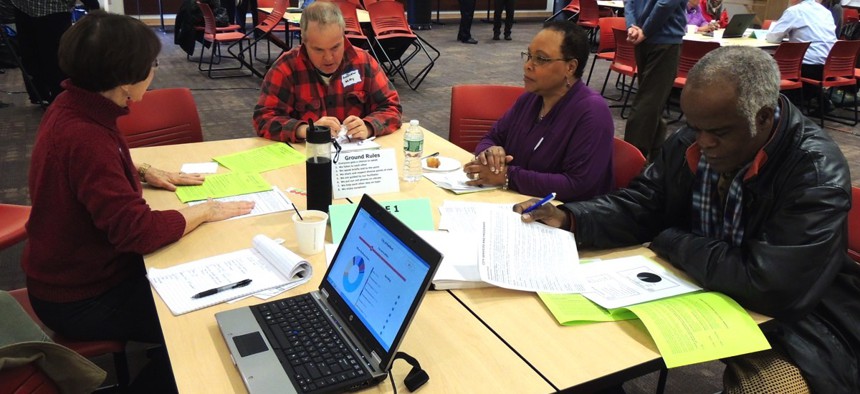Budget Simulator Puts Citizens in Control of Government’s ‘Fiscal Spigot’

Courtesy of Hartford

Connecting state and local government leaders
The latest interactive infographic for state and local governments has won over cities in financial trouble or improving transparency.
Faced with a $49 million budget shortfall in April, Hartford, Connecticut’s city hall leadership wanted budget input from citizens.
After holding two live, informational events at the Hartford Public Library, the city became the first client to put its 2015-16 budget into Balancing Act—an interactive, online budgeting simulator for state and local governments’ residents.
Interactive government infographics are catching on, and in the next four-to-six weeks three more to-be-announced contracts are slated to adopt Engaged Public’s tool, including one of the 10 largest cities in the country.
“Hartford officials were wrestling with a very significant budget deficit, and in the spirit of democracy they wanted to share that reality with residents,” said Chris Adams, Engaged Public’s president. “They’re buying in because there’s going to be someone paying no matter what, but this allows for a more constructive conversation.”
The Denver-based public policy firm runs leadership development programs mostly in Colorado, teaching the intricacies of budgeting, and in 2007 launched Balancing Act’s predecessor Backseat Budgeter.
When the Great Recession hit, cutting into state and local governments’ revenues, public officials nationwide began inviting citizens to “feel their pain” on the spending side of budgets with the simulator—engaging them to solve the problem.
Balancing Act employs a more user-friendly interface, and budgets can be added in a matter of hours, when it once took three weeks.
The first state to use Balancing Act, Colorado’s $10.3 billion budget simulation includes $186.5 million in Taxpayer Bill of Rights refunds as a spending item. Colorado has strong constitutional provisions mandating the state refunds any money it does not spend.
By putting TABOR refunds in Colorado’s simulator, Balancing Act, without judgement, gives residents control of the fiscal spigot and has them question their state’s revenue limit. They can keep their refund or put some or all of the money toward transportation, higher education or infrastructure.
“It’s a great way to educate people about what that choice is, and they get it,” Adams said. “They get what the policy tradeoffs are. We’re not asking anybody to become a policy wonk.”
Users spend an average of eight minutes in the simulator, though they can delve as deep into the issues as they want clicking through revenue and spending items and sharing their opinions on how money should be allocated.
The simulator forces residents to wrestle with the revenue side, making them responsible for cutting a project or increasing a tax to save something they value, like parks.
When Colorado made the decision to invest in the managed care approach to health care with its Medicare budget for the long-term savings, in spite of the short-term costs, more residents were involved in the decision because of Balancing Act, Adams said.
Engaged Public repurposed its nimble Colorado budget database to also calculate a taxpayer receipt. The state operates off a mix of taxes—mostly on income and sales—so users are asked for their income for a gross adjustment, age to estimate the sales taxable goods they buy and driving mileage for the gas tax they pay on par.
From there they can see how those tax dollars are actually spent by their government.
“It’s very enlightening,” Adams said. “The thing that pops out at people is we pay about the same on higher education in Colorado as we do on prisons.”
Adams noted Balancing Act attracts two types of clients: governments experiencing serious fiscal troubles like Hartford or those seeking to continue a tradition of innovation and building public trust like his mystery city.
Residents can enter their ZIP code on Balancing Act’s site to explore the available budgets or request their local officials add their government’s budget.
“It takes a special type of government leader to say, ‘I was elected to make decisions, but I don’t want to make them in a vacuum,’” Adams said.

NEXT STORY: A Way to Fix Illinois’ Pensions Crisis?





